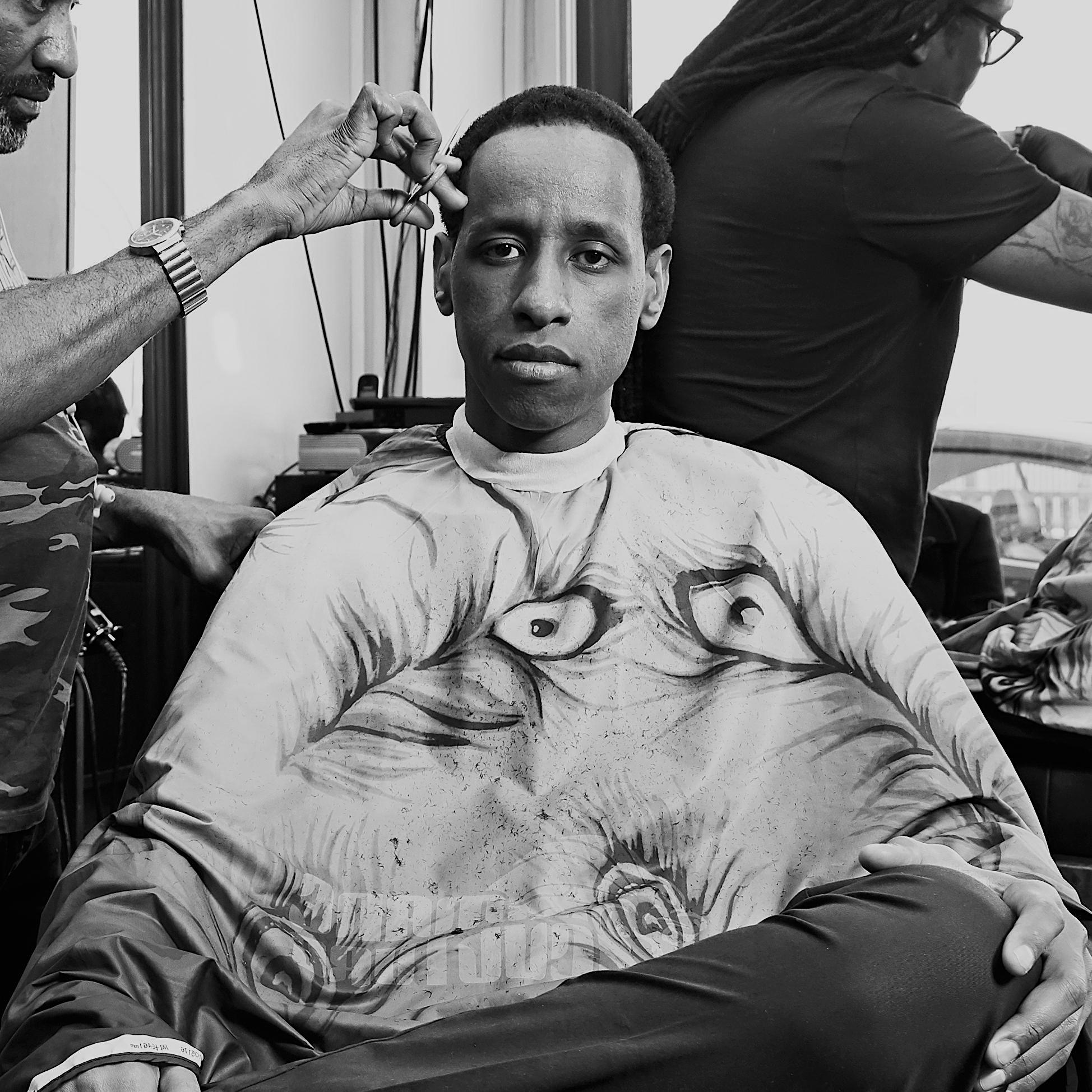
Hashi Mohamed: Against the odds
Hashi Mohamed, is a renowned barrister of Somali heritage and also one of the most sought-after litigators in the UK. He’s also the author of the controversial book: ‘People Like Us: What it Takes to Make it in Modern Britain’.
His early life
Growing up in Kenya, Hashi, had four siblings – a fifth died at a young age. He also had six half-brothers and sisters. His father passed away in 1993, when Hashi was nine years old, leaving Hashi’s mother as the primary carer. The family was uprooted and sent to the UK as refugees.
Initially, the four young children lived with an aunt in North West London: bouncing from one council estate to another. His mother would later join the family.
Early school life
Struggling with his own identity and place within his new home, Hashi was sent to a struggling comprehensive school in North-West London. He would later describe his time at the school as difficult (the headteacher was at one point beaten up and the teachers were constantly the subject of verbal abuse). Despite the negative distractions and often violent school life, Hashi managed to excel in his studies, thanks to a succession of what he called adult mentors and he eventually gained a place at the University of Hertfordshire where he studied Law and French.
By the age of 18, he had gained British citizenship and acquired his first passport, giving him the ability to travel beyond the borders that had confined him throughout his youth. This allowed him to return to Nairobi for the first time since his father’s death. Hashi used his time in Kenya to find vital clues about his identity and to delve into his own heritage. But staying with his uncle, a successful entrepreneur with a large house and thriving business, highlighted all the things he had been deprived of during his formative years and filled him with a renewed inspiration to better himself – an inspiration that he brought back to Britain with him.
The lack of faith others had in him became a form of liberation and empowerment for Hashi, paving the way for a dogged minded youth who made it his goal to succeed regardless of his financial situation. In his book ‘People Like Us’, he notes that while his struggle to rise above the expectations of his upbringing is an inspiring story, it is also an incredibly sad one. But the sadness doesn’t come from the trials he experienced as a child. It is more to do with how his success in rising above his social upbringing is still unusual in British society. This suggests that there have been countless brilliant minds who’ve fallen through the cracks of the British education system.
Despite the challenges of living in the UK, he would later become grateful for the asylum the UK gave his family, but he is often scathing over the treatment of migrants by authorities. In his opinion the initial help his family received ran dry far too soon and they were left, as he put it: “To fend for themselves”. With little money beyond the basic housing and the scant benefits his mother and aunt were given, food was scarce and basic essentials, such as clothing and equipment for school, were beyond the family’s means.
Hashi became vocal in his criticism of the UK’s immigration system and the need to offer more help for those at the bottom of the social ladder. He has often argued that if the government is unwilling to help out immigrant families in a meaningful and financial way then they shouldn’t let them into the country in the first place. His book highlights the plight his family faced and is an impassioned plea for more support for those who are in a similar situation.
Life as a student: The Oxford years
After graduating from Hertfordshire University, Hashi was awarded a postgraduate scholarship at Oxford, which would eventually lead to a position with No5 Chambers. This was quite a feat for an immigrant who’d lived his life in one deprived neighbourhood after another. Before taking up the scholarship at Oxford, Hashi worked as a broadcast journalist with the BBC. This interest in current affairs still lives on today and has led to him taking part in a number of radio broadcasts for Radio 4.
During his time in higher education, first at Hertfordshire and then Oxford, Hashi’s academic prowess began to emerge and with it a gratefulness for the opportunities he now had. He attributes this to his improved work ethic, leading him to spend countless hours reading and studying. Oxford University gave Hashi an avenue to widen his horizons, knowledge, and mix with high achievers whilst giving him a chance to enhance the qualifications he already had.
When asked years later what the best part of going to Oxford was, he replied rather dismissively, “Football and cycling”, before contemplating for a moment and adding, “and keen debating”. The latter, almost flippant comment was something he’d become increasingly noted for in his time at university and brought Hashi to the attention of his peers and teachers. This would eventually lead him to getting noticed by No5 Chambers, one of the largest barristers’ chambers in the United Kingdom, with offices in Birmingham, London, Bristol and Leicester. Some might consider his flippant answer dismissive or almost arrogant, but it is in keeping with the unassuming lawyer’s reluctance to talk honestly about his own achievements and impressive skillset. In his heart he is still the Kenyan immigrant with Somali heritage who made his own luck, despite the system.
Hashi Mohamed’s career: the rise to the top
After his work with BBC Radio, Hashi realised that a career in law would not only provide him with a challenge but would allow him to flex muscles in oration and debate. The road through the legal arena was never going to be easy, in a world where 71% of all barristers are privately educated. Understanding the disadvantages inherent with his own upbringing and early education, he enlisted the help of Elizabeth Rantzen, a noted CEO of a barristers’ chambers to help him connect more easily with members of the legal world.
During in-depth discussions with Ransom, Hashi began to understand how best to forge successful relationships with people from different backgrounds than himself.
Over time, Hashi began to appreciate the cultural experiences of the upper class and would adapt his own personality to suit those around him. In his own words he became:
“Chameleon like. It’s a trick you have to perform. You have to be a number of people in a number of different settings”.
Around his family he would be Hashi, the Black Kenyan immigrant with Somali heritage. But around his legal peers he would be Hashi Mohamed the smart, keen debating, legal expert with what was once described as an Etonian accent and a taste for the finer things in life. This is something which will resonate with a lot of black and ethnic minorities, the need to wear different hats in order to get a seat at the table. Granted this is not how it should be, it’s just the way it is at present. However, we now have opportunities at the said table, which were previously not available to us. There’s a long way to go, but Hashi’s story shows both the positive and negatives of British life, that refugees and Black people face today.
Through hard work and effort, Hashi gained a place in No5 Chambers and began a successful career as one of the highest rated planning barristers in the UK.
As his reputation grew, his skills came to the attention of senior figures in the legal profession, including David Anderson QC, the Independent Reviewer of terrorism legislation in the country. Anderson enlisted Hashi as his advisor and the two worked on a wide-reaching review of the anti-terrorism laws in the UK.
Hashi has excelled in a number of high-profile cases related to human rights issues and public law and was enlisted by the Secretary of State to act in over one hundred appeals heard at Immigration Appeals Tribunals.
Accolades
2014: Pegasus Scholar, the Pegasus Trust. Hashi spent a number of weeks working for Al-Tamimi and Co and the DIFC courts in Dubai.
2013: International Visitor Leadership programme delegate (“IVLP”). Hashi was one of eight individuals nominated to take part in a judicial exchange programme with the United States visiting Washington D.C., Denver, Colorado, Houston and Texas.
2011: Three month internship at the International Criminal Court: The Hague Award, Lincoln’s Inn.
May 2010: Lincoln’s Inn opening mootiing competition champion, judged by Lord Walker of Gestingthorpe.
Our take on People Like Us: What it Takes to Make it in Modern Britain
Hashi Mohamed’s powerful book, ‘People Like Us: What it Takes to Make it in Modern Britain’, is a timely reminder that social mobility in this country is something not easily accessible to most people. Hashi’s story reminds us that social immobility is the norm for many people in Black communities and needs to be addressed.
Hashi’s book details his fight to rise above both his economic status and his status as a refugee immigrant. It highlights the need for our government to be more proactive in tackling the uneven playing field which leads to people with the same skill sets and intelligence falling through the gaps of society. Readers of his book share a feeling of sadness and frustration. Sadness that Hashi, a clearly intelligent and capable young man had to fight a system that was stacked against him from the outset, and frustration that more people like him will never get the opportunities he fought so hard to attain. This led Hashi to follow the path of those who helped shape his life as a young refugee. Hashi mentors many young people who are at various stages of their careers. Hashi is also a trustee at Big Education, a trust which oversees three inspirational schools in London and the South East.
People Like Us is a passionate and personal portrayal of Hashi Mohamed’s chaotic childhood and his meteoric rise to the top of his profession. It’s an uplifting yet cautious tale, which brings into sharp focus the work we still have to do in our quest for racial equality. The book goes beyond the: “if I can do it, so can you” narratives and exposes the issues that Black immigrants face.
You can’t help but be left with a yearning for a fairer and more equal society, one where all people, regardless of gender, race or economic background, are encouraged to soar and given opportunities and support…



